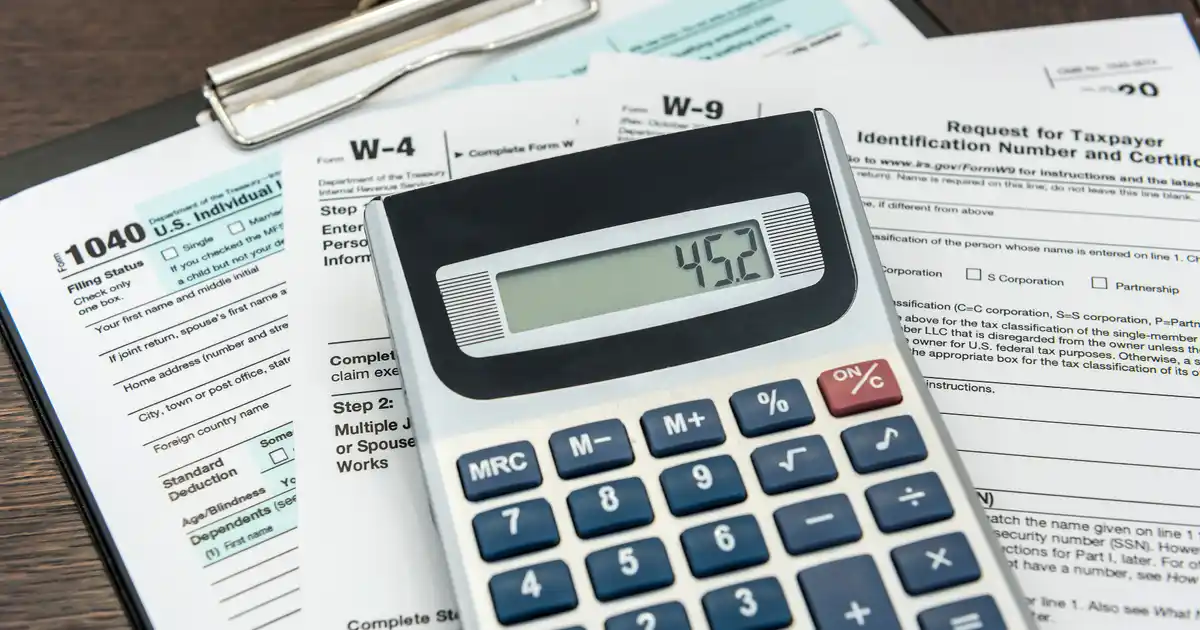- You 2021 Tax Return is due by April 15.
- If you suspect you will owe the IRS money, start making a plan for repayment now.
- Start planning for your 2022 Tax Return now, in order to avoid any last minute surprises.
It’s a new year, and Spring is just around the corner. With the warmer weather comes one annual certainty: it’s tax season again. It’s time to start thinking about your return — especially if you have a tax bill headed your way. After the uncertain year that many of had in 2021, you might not be ready to pay that outstanding tax bill. That’s not good. However, you might be surprised how many people aren’t prepared to pay their taxes every year. Let’s go over the steps you needs to take in order to get ready for the 2022 tax season.
How Much Do You Owe?
One of the best things you can do is figure out your taxes as early as possible. Unfortunately, many of us put it off for as long as possible — especially if we expect to owe money. And look, I get it. Doing your taxes is boring and tedious. And if the end result is a hefty bill, that makes it even more painful. On the other hand, you might not even know where you stand. This is doubly true if you should have make quarterly tax payments, but didn’t. Your tax balance is information you need to know, even if it hurts.
You can roughly work out the amount you owe with the information you already have. You don’t need to file your actual tax return if you aren’t ready yet, but at least you’ll have a better idea of where you stand. If you’re going to owe money, it’s best to know approximately how much. Then you can at least start to prepare yourself for payment.
I try to send all my documents to my accountant as early as possible. That way, I have the most time possible to plan before my tax bill is due. I often end up owing money — even though I pay my quarterly amounts. In my case, the biggest culprit is often state taxes. So I want to know, as soon as I can, if there’s anything I need to prepare for.
 Shutterstock
ShutterstockStart Preparing to Pay Your Taxes
If you’re getting a refund, then that’s great. There’s no real need to stress out. If you’re going to owe money, though, you better start planning for it now. It makes sense to consider your options early. If you owe a relatively small amount, you can prepare by setting aside a little bit of money each week. Then when April 15 comes around, you’ll hopefully be prepared to pay what you owe.
Another strategy is to consider some payment plan options. The federal government offers a payment plan to taxpayers who can’t make their payments on time. Additionally, most states also offer payment plans. So, if you don’t think that you will be able to pay the entire amount, you can see if you are eligible for a payment plan.
A Word of Caution
Be aware, though, that these payment plans are considered loans. You will be charged a fee, so be ready for that extra cost. Additionally, in some cases, you are considered in default if you miss a single payment. Your credit score will probably take a hit. Find out if you can set up an automatic withdrawal, so that you don’t have to worry about missing a payment.
Thinking ahead to next year, set aside an amount of money every month to pay taxes. You can still pay quarterly, but having a pool of money ready for your tax bill can save you a lot of financial stress. It’s never fun to owe money to the IRS, but it can be a little less painful if you’ve plan ahead, rather than waited to the last minute.
 Shutterstock
ShutterstockMoney Isn’t the Only Tax Issue
So that’s the money part. If you are eligible for a refund, then it’s no problem. If you own money, you need to come up with a way to pay. But what about your actual tax return itself? How should you prepare for that? What documents or paperwork will you need?
Being organized is key. Knowing exactly where to find every piece of information you’ll need to file an accurate tax return will help you get the task done as quickly as possible.
Know What Paperwork to Expect
Various organizations are supposed to send out paperwork by the end of January. That means you should have what you need by the first or second week in February. It helps to know exactly what you’re expecting. Some common forms to expect include your W-2 from your employer, a statement of interest from your mortgage lender, or student loan interest statements.
Most forms are timeless and the same year after year after year. However, watch out for new forms as well. This year the IRS is sending out a new Letter 6419 to those who received an advance last year for their child tax credit (known as the Advance Child Tax Credit (AdvCTC) Payments). There will be other new forms and letters introduced in the future too. That’s why while I like to start sending my accountant documents early. I just don’t ask him to actually file my taxes until later, in case I get a form I wasn’t expecting.
Think about what other paperwork you might receive depending on your situation. This includes information about side income or dividends, interest income, and statements related to your retirement account.
Don’t forget about paperwork you might need to request. If you want to apply for a dependent care credit, you will need tax ID information from your care provider. When you have a business, it usually makes sense to prepare a Profit & Loss document. Make a list of paperwork involved and then set up a folder to keep it all. Check off each item as you receive it.
 Shutterstock
ShutterstockBegin Organizing Receipts
There are a number of deductions and credits that require receipts. If you donate to charity, you need a receipt that shares the appropriate information. For business owners, keeping receipts of expenses is obviously important.
Now is the time to round up your receipts and get organized. Sort out receipts by category, making sure to keep business, medical, donations, and other categories separate from each other. This will make it easier to verify your costs and claims as you prepare your taxes (or if you bring your taxes to a professional).
Review The Year For Additional Information
Don’t forget to review your year for things you might have missed. Whether it’s the mileage on your car or the fact that you’re eligible for a health care tax credit, you might have missed something. If you use financial software to help you track your spending, generate a report that can help you identify spending categories. This is a good way to review where your money went and find items that you might have missed for tax purposes.
This is also a good time to see if you can make last-minute moves for a deduction. You can make a last-year contribution to a Traditional IRA or Health Savings Account even if it’s already past December 31. Think hard about whether these make sense in your situation, since there’s an annual limit to how much you can contribute to tax savings accounts.
 Shutterstock
ShutterstockMake Your Appointment
If you prepare your own taxes, now is the time to figure out whether you want to buy the new version of the tax prep software you’ve always used. If your taxes are fairly simple, there are actually free options available — they are usually just hidden, since these companies want you to buy their products.
Maybe you’re not sure of your options when it comes to tax breaks and other items. If so, it can help to consult a tax professional. My accountant helps me prepare my taxes, but he also discusses possible tax strategies for the upcoming year (and beyond). This can be a great help down the road if you want to continue to improve your tax efficiency.
The cost of using a tax professional might even be more than worth it. The tax savings that my accountant has found for me far outweigh his fee.
For those who uses a tax professional, call soon to make an appointment. Or at least email them, letting them know to expect documents from you soon. Make sure you start the process early. It’s the busiest time of year for them, so can quickly get swamped down. You don’t want them to rush through your file or file your taxes at the last minute. Start early and you’ll be ahead of the game.
Now What Abut Next Year?
Hopefully, I’ve convinced you to start your taxes for last year. But now I’m already talking about this year — as in, your 2022 taxes that you will have to file next Spring. I know it’s only January, but stop procrastinating. You shouldn’t have to rush your tax return every year. Your tax organization and preparation efforts don’t need to be squeezed into January 1 to April 15 every year.
Make your taxes an all-year-long project. Plan your tax strategy. Keep your receipts and documentation organized. Make your quarterly payments (if applicable) on time. If you stay on top of your 2022 tax situation, filing your return next Spring will be a breeze. Wouldn’t you like your tax efficiency to go up a bit?
 Shutterstock
ShutterstockWhat Deductions and Credit are You Eligible For?
Do you find yourself trying to figure out what deductions you can squeeze in at the last minute? Especially as the calendar winds itself down in December? Instead of waiting until the end of the year, plan for your tax deductions and credits all year long. Put together a giving schedule that spreads out your charitable donations throughout the year. That way, you won’t be straining your budget around year end, when holiday spending is also stressing you out.
The same strategy can be employed for other deductions. If you have a home business, plan out those deductions year-round. From office supplies, points paid on refinancing your mortgage, or HSA contributions, plan ahead now.
Research and Plan Ahead
You can also plan ahead for tax credits. Look at what credits you are eligible for (or could be eligible for) and make sure that you meet the eligibility requirements. It’s much easier to plan to reduce your tax bill if you look at the situation now and plan out over a year. That way, you can make sure that you are positioned to take advantage of tax breaks, rather than being disappointed when you don’t quite meet all of the requirements later.
Take the Roth IRA contributions for instance. You may have missed a year, two, or many years of contribution just because you couldn’t come up with the full allowable limit all in one shot. That’s totally understandable. It’s just not easy to come up with $6,000 to invest all at once. However, consider contributing $500 a month instead. If you contribute now and keep at it for the whole year, you would have met the $6,000 limit by December. Now $500 isn’t just chump change, but it’s much easier to come up with than $6,000, right?
 Shutterstock
ShutterstockOrganize Your Paperwork Now
You should also keep your paperwork all year. I keep a file just for tax-related documents. As soon as I bring home a receipt, whether it’s for business travel or for some other reason, it goes right into the tax folder.
It doesn’t even have to be a hard-copy folder. You can set up a folder on your computer and then scan receipts and other relevant documents into it. The important thing is that you stay organized all year. That way, you won’t be scrambling to figure out what happened to all of your documentation later. The right filing system can help you stay on top of things all year and prevent last-minute meltdowns during tax season. It’s also way easier to keep a record because the IRS requires you to keep proof for seven years afterward.
The Bottom Line
Whether it’s preparing for this tax filing season or next, now is the time to get ready. As with just about everything in life, the earlier you start, the more advantageous it is for you.
You really don’t want to wait until the last minute. As I’d like to remind my children from time to time, it takes just as much time to do any task early than to do the same task late. The only difference is that when you do it late, then you have to spend the whole time worrying about needing to do it too. Why not just get it done and out of the way and out of the mind?








